|
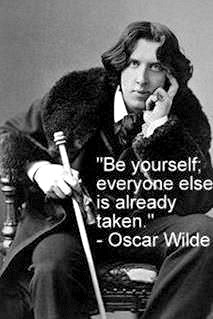
Do
you like to write poetry? Do you have an affinity for reading and studying
poetry? If so, you might enjoy the website "All Poetry." You can search for poems. There are contests, feedback, and forums.
Check it out.
go to All Poetry
"Housework can't kill you, but why take the chance?
- Phyllis Diller
Ever need a perfect quote? Whether funny or profound, you'll get plenty of ideas on the Brainy
Quote site. For starters, select by types, topics, and occasions.
go to Brainy Quote
"Where there's a will, I want to be in it."
more surprising comments
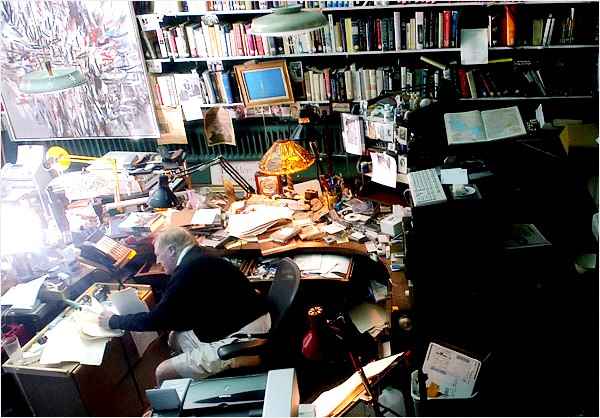
|
| William F. Buckley, Jr. in his home office in Stamford. Photo: Suzy Allman. Click to enlarge. |
When is the last time you read an obituary headline
about vocabulary? Yet isn't that the first thing that comes to mind when you think of William Buckley?
The New York Times lauded his polysyllabic exuberance and refined,
perspicacious mind. The legendary writer, editor, and TV host was a sesquipedalian (i.e. he used
long words) whose sparkling phrases sent listeners agog.
Detractors called him "pleonastic," saying that he was
a linguistic show-off for using more words than necessary. But in this time of abbreviated texting, emoticons, and sound-bites--
it's lovely to recall Buckley's genuine love of words and language-- and his expressive mastery of English. His son Christopher
Buckley said his dad died at his desk while writing another column-- no doubt one that would require the reader to grab the
OED.
more on Bill Buckley's words
Let's get real.
More non-virtual interaction would be good. Texting is great
but it's not talking. Emoticons are fun but they're not handshakes. Emails are terrific but they're not letters.
"Don't tell me words don't matter. 'I have a dream'... just words?
'We hold these truths to be self-evident, that all men are created equal'... just words? 'We have nothing to fear but fear
itself'... just words? Just speeches?
- Barack Obama
More good anagrams:
debit card / bad credit
conversation / voices rant on
dormitory / dirty room
astronomers / moon starers
funeral / real fun
the eyes / they see
decimal point / I'm a dot in place
snooze alarm / alas, no more Zs
Presbyterian / best in prayer
animosity / is no amity
election results / lies, let's recount
eleven plus two / twelve plus one
Did you ever notice that 'BEGIN'
and 'BEING' are anagrams? Perhaps that's telling us something of import.
They write the words...
Lest us not forget the WGA writer's strike that
left comedians speechless and dramas in limbo for more than a hundred days. Years later series programming is still screwed
up. It would be nice if folks didn't think that actors just make it up as they go along, and that goes for so-called
'reality' shows too.
go to Writers Guild of America
"Answers.com" is a handy on-line word check. It
uses The American Heritage Dictionary and offers audio pronunciation.
Try it.
|
|
|
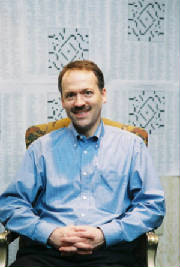
|
| Puzzle Master Will Shortz |
"Wordplay," the movie, gives us
an inkling of the intricacies of making addictive crossword puzzles-- and introduces us to the hard-core addicts. And Will Shortz runs the show. Watch the ultra-brainy solve these things in a flash!
We get a look at the Annual American Crossword
Puzzle Tournament (founded by Will Shortz). It's a peek into a world where the contestants create a buzz of lively,
friendly competition. There are interviews with puzzle enthusiasts Bob Dole, Ken Burns, Jon Stewart, and Bill Clinton.
For crossword solvers it's a must-see DVD.
Will Shortz is the editor of The New
York Times Crossword Labyrinths.
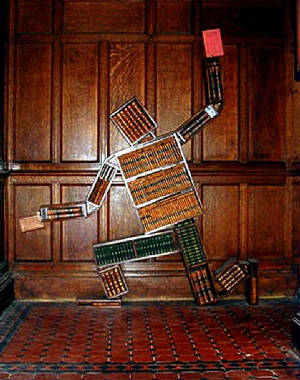
|
| Where do books go when we run out of shelves? |
Do you kow an umlaut from a schwa?
go to diacritic marks
Humpty Dumpty's boast:
"They've a temper, some of them-- particularly verbs-- they're the
proudest. Adjectives you can do anything with, but not verbs.
However, I can manage the whole lot of them!
- from Lewis Carrolls' 1872 classic
"Through the Looking Glass."
 |
 |
|

When words won't come...
"Careful with your fingers! Don't touch writing! You
don't know what it is to write.
"It's a crushing task; it bends your spine, blurs your
eyesight, creases your stomach, and cracks your ribs."
- text in a medieval manuscript
|
|
 |
 |
"I suppose that what turned me into a writer was the belief
that a few words in a particular order could work a magic spell-- make an obscure person famous, a poor one rich, a nerd lovable..." - Edmund White
 |
 |
|
Metaphorically speaking:
"Our ordinary conceptual system, in terms of which we
both think and act, is fundamentally metaphorical in nature."
- Lakoff and Johnson
"Metaphor brings out the thisness of a that, or a thatness of a this."
- Kenneth Burke
"Midway between the unintelligible and the commomplace, it is a metaphor
most which produces knowledge."
- Aristotle
"The metaphor is probably the most fertile power possessed by man."
- Jose Ortega y Gasset
"If natural language had been designed by a logician, idoms would not
exist."
- Philip Johnson-Laird
|
|
 |
 |
Why can't those Brits speak English? Translation,
please:
go to US vs. UK slang
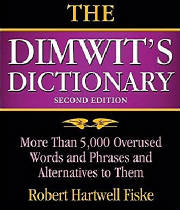
|
| New edition by Robert Hartwell Fiske |
The thud of dull words:
A witticism is a clever phrase or remark that sparks
glee. Author Robert Hartwell Fiske would like to hear more of them. Nowadays
he hears their opposite. He calls them "dimwitticisms."
Fiske hears formulaic expressions from
lazy minds. With such a great language available for our use, why do we rely on the "tried and tired."
We have so many opportunities for genuine wit when we automatically slip into the overused.
In The Dimwit's Dictionary:
Infantile phrases
Moribund metaphors
Plebeian sentiments
Quack equations
Suspect superlatives
Withered Words
Wretched redundancies
Grammatical gimmicks
"A living hell" is a moribund metaphor. There are so many less common words to express this. How about sulfurous, hellish,
impossible, infernal, intolerable, unbearable, unendurable? The first person to say "a living hell" was witty, but it's been
multi-cloned into a "dimwitty."
"Have (take) a listen" is inane and infantile.
It's a sloppy way of saying "Listen." Fiske says "Jounalists and media personalities who use this
offensive phrase ought to be silenced; businesspeople, dismissed; public officials, pilloried." Wow.
Fiske urges us to use potent and captivating language that lights up
a conversation. Not bad advice.
go to Vocabula Review

|
| The quotable Brooke Astor. |
Brooke
Astor
New York City's unofficial first lady and grande dame of society and
philanthropy, died at the age of 105. Widowed for 48 years, she had many suitors and was often asked if she wanted
to marry again. She said:
"I just don't want anyone tugging at my sleeve at 10 o'clock telling
me it's time to go home." She confided in a friend, "I want to go at my own speed, and it's a lot faster than theirs."
For her 100th birthday party, Astor was asked who she wanted on the guest list. She quickly responded: "One hundred librarians."
Speech is civilization itself.
The word, even the most contradictory word, preserves contact. It is silence which isolates.
Have Americans lost some verbal clarity?
Or Sanity?
"Only in America can you be Pro-death penalty, Pro-war, Pro-nuclear
weapons, Pro-guns, Pro-torture, Pro-unmanned drone bombs, Pro-land mines, and still call yourself 'Pro-Life?"
- John Fugelsang
The results are in for The Washington Post's nutty
'neologism' contest. Readers are asked to submit alternative meanings for common words. Here are the this year's 'winners.'
1. Coffee (n.), the person upon whom one coughs.
2. Flabbergasted (adj.), appalled over how much weight you have gained.
3. Abdicate (v.), to give up all hope of ever having a flat stomach.
4. Esplanade (v.), to attempt an explanation while drunk.
5. Willy-nilly (adj.), impotent.
6. Negligent (adj.), describes a condition in which you absentmindedly
answer the door in your nightgown.
7. Lymph (v.), to walk with a lisp.
8. Gargoyle (n.), olive-flavored mouthwash.
9. Flatulence (n.) emergency vehicle that picks you up after you are
run over by a steamroller.
10. Balderdash (n.), a rapidly receding hairline.
11. Testicle (n.), a humorous question on an exam
12. Rectitude (n.), the formal, dignified bearing adopted by proctologists.
13. Pokemon (n), a Rastafarian proctologist.
14. Oyster (n.), a person who sprinkles his conversation with Yiddishisms.
15. Frisbeetarianism (n.), (back by popular demand): The belief that,
when you die, your Soul flies up onto the roof and gets stuck there.
16. Circumvent (n.), an opening in the front of boxer shorts worn by
Jewish men. See, we warned you that these were nutty. Can you think of more?
America's top word mavens are at it again and
better than ever.
more on Elster and Lederer
 |
 |
|
Spreading the word:
"A writer is somebody for whom writing is more difficult
than it is for other people." - Thomas Mann
"Be obscure clearly."
- E.B. White
"If it sounds like writing,
I rewrite it."
- Elmore Leonard
"I was working on the proof of one of my poems all the morning, and took out a comma. In
the afternoon I put it back again."
- Oscar Wilde
"I think I did pretty well, considering I started out with nothing but a bunch of blank paper."
- Steve Martin
|
|
 |
 |
Where do you stand in the language wars? Do you describe
or prescribe? Are you flummoxed with our Velcro language? Are you maddened by the "dumbing down" of American English?
The Inarticulate Society
by Tom Shachtman,
more on "The Inarticulate Society"
Cassell's Movie Quotations, Nigel Rees, Cassell, London.
Ardent movie-goers will be familiar with many of the soundtrack quotes
(Michael Caine in Alfie: "What's it all about? Know what I mean?"), but happily Rees gives more quotes about movies than
quotes from soundtracks. The verbal "outtakes" of actors, directors, producers, screenwriters, and movie critics are
the better part of this collection.
Here are a few...
"I did a picture in England one winter and it was so cold I almost
got married."
- Shelley Winters
"The most expensive habit in the world is celluloid, not heroin, and
I need a fix every few years."
- Steven Spielberg
"A film is never really good unless the camera is an eye in the head
of a poet."
- Orson Welles
"Every writer is a frustrated actor who recites his lines in the hidden
auditorium of his skull."
- Rod Serling
"There used to be a me behind the mask, but I had it surgically removed."
- Peter Sellers
"Strip away the phoney tinsel of Hollywood and you'll find the real
tinsel underneath."
- Oscar Levant
Are you a "right brainer?"
Visual Thesaurus is a fascinating online
thesaurus/dictionary that uses an interactive "Think Map" with 150+ thousand words. Although we make a point of listing
only no-cost links, this one has a charge. Subscriptions are $3/mo or $20/yr. -- with a two-week free trial. But it's worth
a look.
go to Visual Thesaurus
go to the great vowel shift
go to the death of handwriting
|
 |
 |
 |
TED was born in 1984 as a conference that invited people
from three worlds: Technology, Entertainment, and Design. The mix proved to be dynamic and its scope
broadened to offer, via video, unparalleled opportunities for millions of viewers. Now
the annual conferences-- one in California-- the other in Edinburgh, Scotland-- are taken seriously, albeit predictably
more entertaining and witty than the Davos conference on global economics. The
best TED talks and performances are accessible to everyone, for free. You can choose from more than
1,400 productions with the option of subtitles in several languages. All TED videos can be safely and freely shared
and reposted. TED brings together many of the world's
most fascinating thinkers and 'doers,' which offers us an unparalleled opportunity for keeping up with fresh ideas and cogent
predictions. Each speaker is challenged to give the 'talk
of their lives' in 18 minutes or less. If you had that chance, what would you talk about?
The word "procrastinate" didn't enter our language until
the 16th century. Before that it was just "later."
Do you use a keyboard
or are you a typist?
If you are the latter, here is some useless information-- the longest word typed with only the left had is
'stewardess.'
The longest word typed with only the right hand is 'lollipop.' These words may be controvertible-- but
some things are for sure:
If you want to practice typing-- "The quick brown fox jumps over the lazy dog" uses every alphabetic key.
And the word 'typewriter' uses only the top row of the keyboard.
Here are some well-worn quips about speeches.
Like the hem of a skirt, a speech should be long
enough to cover the subject but short enough to be interesting-- and it must never drag.
Here's a 'drag' story: A man walked out of a hall where a speaker
was addressing a meeting. Someone in the corridor asked him if the speaker had finished his speech. "Yes," he said. "He finished
his speech shortly after he started, but he still hasn't stopped talking."
Then there's the long-winded hostess who raised her glass with an
elaborate toast that just wouldn't quit. One of the guests murmured to another: "What do you think of her execution?" The
other repliled, "I'm all for it."
By far the best after-dinner speech I've heard was when the
guy across the table said "Waiter, bring me the check."
CIA Director
David Petraeus is emphasizing language excellence at the agency-- and it's about time. The United Nations has 5 official
languages: Arabic, French, Spanish, Chinese, and Russian. You can now find CIA website material
in all these languages. Always a great site, it's now better than ever. Also, the site offers a virtual tour of the CIA Museum.
go to the U.S. Central Intelligence Agency
go to the CIA museum tour
Bad Lip-reading has gone viral. Enjoy.
go to bad lip-reading
"Rights are not actually supposed to be voted on. They're called rights."
- Rachel Maddow
go to Rachel Maddow
Learning a second language gives a big boost to the health of the brain-- and makes you
smarter.
go to the Bilingual Brain
Ever think about the people who actually became words?
Samuel A. Maverick, former mayor of San
Antonio, Texas, was known for letting his unbranded cattle roam free.
Jules Leotard, a French aerialist, was the
creator of the flying trapeze act.
Bob Cobb, owner of the Brown Derby in Los
Angeles, served up a new and popular salad.
Charles Cunningham Boycott, an English estate
manager, refused to lower rents for poor tenant farmers, thereby inspiring a rent strike.
Amelia Bloomer, and early American feminist,
championed a certain ladies' undergarment.
Captain Ed Murphy, an aircraft engineer,
complained about a technician on his team, saying 'if there's a way to do it wrong, he will." And his pessimism became a 'law.'
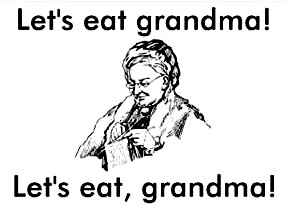
OCCUPY was voted 'Word of the Year' by the American
Dialect Society. It's a verb-noun combo that refers to the occupy protest movement.
Previous 'winners' are APP (2010), Google (2009),
Bailout (2008), Subprime (2007), Plutoed (2006), and Truthiness (2005). The
Society was founded in 1889 and is dedicated to the study of the Engligh language in North America.
go to American Dialect Society
We have a big, hefty language. It's been
called the most cheerfully democratic and hospitable language in the history of mankind.
It's also the largest-- by far, with at least 700-thousand words. The
second largest language is German, lagging with only 185-thousand words. Russia has 130-thousand. And France has to make do
with only 100-thousand words. We have no valid excuse not to expand our vocabularies.
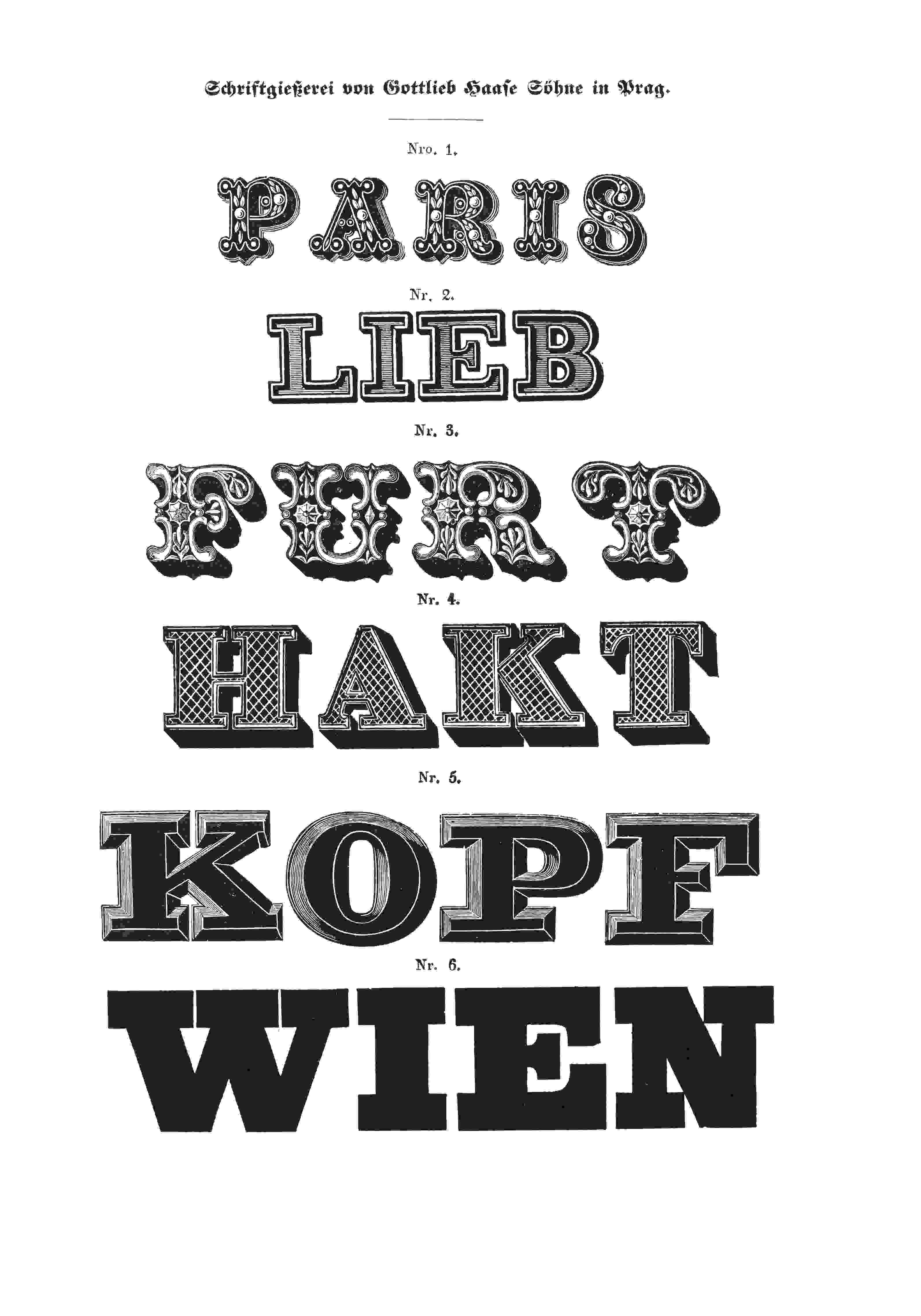
|
| Victorian fonts can be spectacularly complex. |
Typefaces
have stories to tell.
Taschen Books has published the first of two volumes on the evolution
of the modern letter (1628-1900). "A Visual History of Typefaces and Graphic Styles" reproduces
pages from exquisitely designed catalogs of their day from William Caslon, Eric Gill and other top designers and calligraphers.
It’s $60, but includes a keycard that gives access to an online
image library with over a thousand high resolution scans that are downloadable for unrestricted use. The second project will
cover specimens from 1900 onwards.
Who writes the memoirs and autobiographies of busy people?
Often it's a ghost.
more on ghosting
Are you a cruciverbalist?
If you love crossword puzzles you're not
alone. Ever since humans made an alphabet they've been playing with clever combinations of letters.
"Crossing Words" is an ancient practice.
Puzzles constructed by Roman literati fascinated the bigwigs. A "word square" was found in the ruins of Pompeii. Here's
a version of the style they treasured:
The first crossword puzzle was in The New York World
on December 21, 1913.
It's constructor, Arthur Wynne, called it
a "word-cross." Soon after a typograpahical error occurred, and from then on the puzzles were known as "crosswords." An instant
success, other newspapers began to run them. Crossword addicts had contests and a Broadway musical was themed with the fun
and frustrations of the puzzles. Over the next decade they became a national phenomenon.
more on the world's first crossword puzzle
Some sites for the puzzled:
Search words on OneLook; check news at Cruciverb; read daily blog at
Crossword Fiend.
go to One Look
go to Cruciverb
go to Crossword Fiend
go to the Puzzle Society
Some thoughts from inveterate solvers:
"Solving the crossword every day is like combing my brain."
- Norman Mailer
"We solve crosswords to become unstuck in time. We enter into a place
of stasis. It's the closest we can come to approach omnipresence."
- Dean Olsher
"Start with what you know and build on it."
- Bill
Clinton
"Did you ever notice how the name Alec Guiness can be jumbled to read
"Genuine Class?"
- Dick Cavett
"When my mind is on the puzzle, I can't worry about what congress is
going to do with the new tax bill."
- Louis Rukeyser
"Finding my name in the crossword would be so gratifying. I'd have
to retire.'.
- Roy Blount Jr.
"I feel a special connection to crosswords because I've become a clue..."
- Celeste Holm
"The attraction of solving a puzzle is the promise of stumbling across
a clue that will elicit a sudden laugh."
- Norman Cousins
on cryptic crosswords:
"These puzzles are on a wavelength only dogs can hear."
- Richard Maltby, Jr.
"Language is the skin of living thought."
- Oliver Wendell Holmes
"Words are pegs to hang ideas on."
- Henry Ward Beecher
"Of all the things I've lost, I miss my mind the most."
- Mark Twain
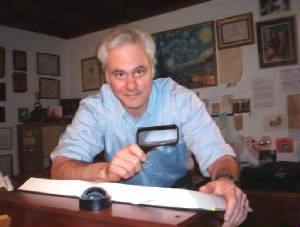
|
| Charlie Elster with his favorite dictionary. |
Charles Harrington Elster is a prolific writer
of "word" books.
"Big Book of Beastly Mispronunciations"
has grown with a new edition. He just keeps keeping on.
Verbomaniacs hang on his every word, for he knows most of them--
pronunciation and all.
He's a master of the English language because at heart he's a lexicomane-- which means he's crazy about dictionaries. If you love words,
get to know Charlie.
His latest book (his 10th) is "The Accidents of Style:
Good Advice on How Not to Write Badly." He helps writers avoid everyday blunders. It's all in the details.
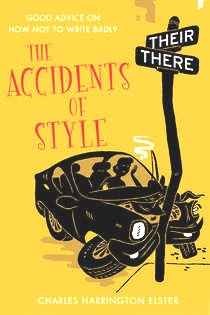
|
| "Accidents of Style" |
go to Charlie Elster
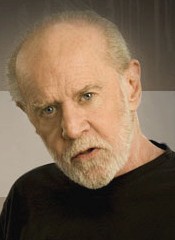
|
| George Carlin, a man of many words. |
"By and large, language is a tool for concealing
the truth."
Carlin was a word man who found absurdities in everyday
language. Mischief triumphed when he skewered dumbness. He forced literacy onto his audiences. Pretentious words drove him
nuts.
He was a master of wordplay: Atheism is a non-prophet organization... and redefinitions: Electricity is just organized lightning.
His complaints
with "flying" words merit second thoughts: Go to your gate. (The boarding pass says gate, the sign says gate, but where is
the damn gate?) Get on the plane. (Hey, I bought a ticket to ride inside. I want to get in the plane.) Near miss. (If it were
a near miss it would be a collision.) Non-stop flight. (When I get to my destination I want the plane to stop.) Final approach.
Deplane. (Yes, we could go on and on....)
go to Carlin quotes
Power Talk International began
in 1938 as the "Toastmistress Club." At the time women were not allowed to join "Toastmasters". The club thrived for
30 years. Then members voted to change the name of their club so as not to sound gender-exclusive. So it became "International
Traininrg in Communications," or ITC-- and thrived for another 30 years. Then members voted
to change the club name yet again-- the thinking being that ITC was a bit vague. So the 21st century version is Power Talk--
and it's still a terrific organization.
|
|
go to Power Talk to read or download its electronic magazine
|
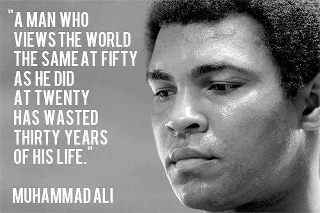
Here's a 'word challenge.'
Do you notice what these
words have in common?
banana
dresser
grammar
potato
revive
uneven
assess
Read the solution 'right to left:'
(.sdrawkcab sdrow daer neht tsal ot rettel tsrif evoM)
"English is a remarkably
clear, flexible, and useful language. We should use it in all of our
communications."
- a bit of tongue-in-cheek from Daniel O'Neal
Oft times, words don't mean what they mean.
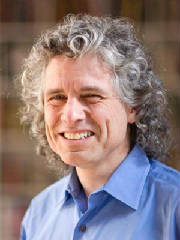
|
| Steven Pinker, Rebecca Goldstein photo. |
Language
is a window into human nature-- a nature that is ambiguous, side-stepping, and full of vagueness and innuendo.
Words don't say it all. Gender-speak is another complication. Men can’t get away with speaking like a woman, and vice-versa
(remember Tootsie?).
For Steven Pinker, the Harvard-based
language guru, hypocrisy is a human universal. He says “when people talk, they lay lines
on each other and do a lot of role playing.”
Why don’t we say what
we mean? Pinker reminds us that “conversational partners are not modems downloading information into each other’s
brains. People are very touchy about their relationships.
"When you speak to someone you presume that the
two of you have a certain degree of familiarity. Every sentence has to do two things at once: convey a message and
continue to negotiate that relationship.”
“Polite talk” keeps things smooth and inoffensive.
We can effuse, exaggerate, and evade. All the while we try to stay in a zone between blatant and subtle. Hurt feelings are
a drag.
In politics, miscalibrated speech can be lethal. Threats
and bribes are veiled. Diplomats use speech phrasing that is palatable to the intended audience. Words can save face.
Talk is our high-value social
currency. Pinker says “Language is a fistula—an open wound through which we’re exposed to an infectious
world. It’s not surprising that we sheathe our words in politeness and innuendo and other forms of doublespeak.”
So how can a human be truly understood?
go to Steven Pinker
Pinker's book is "The Stuff of Thought: Language as a
Window into Human Nature."
"Slang is language that rolls up its sleeves, spits on
its hands, and goes to work."
- Carl Sandburg
"Words are the small change of thought."
- Jules Renard
| CRIMINAL WORDPLAY AT THE LOUVRE |

|
| The Louvre, Paris. Photo: LORBIT. |
You may have already heard this silliness-- but here
goes...
A thief entered the Louvre, grabbed some paintings and made his getaway.
But he ran out off gas and was captured within minutes. The 'mastermind' explained the error of his ways: "Monsieur,
I had no Monet to buy Degas to make the Van Gogh."
Do you have deGaulle to share this? We post it because we have nothing Toulouse.
Terse advice to writers from Lewis Carroll:
" Go on till you come to the end; then stop."
@
Why in the heck is this thing our
new address?
The "at symbol" landed on new 1870 typewriters because
it was routinely used in commerce. 4 qts.@ $12
is succinct.
When the computer techies feverishly compounded our vocabularies
by grabbing mice and icons, @ flew from it's little spot on the northwest corner of the 'qwerty' keyboard to the internet.
The doodle-ish doodad has been around for about 500 years.
Originally it stood for "amphora," a unit of volume for grain, wine, or oil. Later, in western
Europe and the U.S., it came to stand for "at the price of." Nowadays, it just means "at."
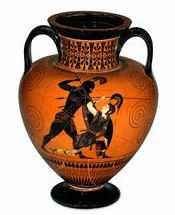
|
| Greek Amphora, signed by Exekias, 540 BC |
The Greek amphora is a jug that holds a
certain amount of wine. It's shape later morphed into the symbol for a quantity of merchandise.
Few outside the Western Hemisphere had ever seen the @ sign before
it insinuated itself into e-mails. Ever since there has been no shortage of imaginative, intuitive names.
Depending on where you are, the @ is a snail, bun,
pig's tail, leech, worm, or a rolled
herring. That's not even the half of it.
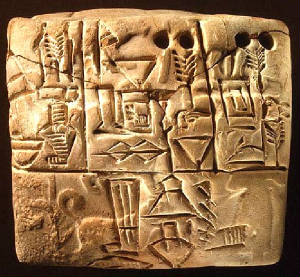
|
| Sumerian tablet., Jamdat Nasr, Vruk111 style, circa 3000 BC, Metropolitan Museum of Art |
In Mesopotania, the Sumerians created the first
written language. Nothing has been the same since. Writing is enbued into our senses.
go to Sumerian script
Do You Speak American?
(Robert MacNeil and William Cran)
Robert MacNeil puts
contemporary American English neatly between the covers of this 200-page companion to the PBS television series of the same
title.
He worked with William Cran, who also co-authored "The Story of English,"
tied to an earlier television series that aired on the BBC and PBS.
Where do you stand in the linguistic wars? Are you a descriptionist
or a prescriptionist? Read on...
more on "Do You Speak American?"
"Language, be it remember'd, is not an
abstract construction of the learn'd, or of dictionary-makers, but is something arising out of the work, needs, ties, joys,
affections, tastes, of long generations of humanity, and has its bases broad and low, close to the ground. Its final decisions
are made by the masses, people nearest the concrete, having most to do with actual land and sea."
- Walt Whitman
(and, in response:)
"How cool is
that!"
- Robert MacNeil
Slang
n. 1. very informal usage in vocabulary and idiom that is
characteristically more metaphorical, playful, elliptical, vivid, and ephemeral than ordinary language
(1750-60 orig. uncert.) [Random House Webster's College Dictionary]
21st century culture and technology brings us a
barrage of slang-- it's impossible to keep up with it. A lot will be found in coming editions of the most conservative dictionaries.
CASSELL'S new dictionary of slang, edited
by Jonathan Green (the big yellow book), offers ten thousand new words. Aaron Pekhas keeps up with earthy street slang
on his Urban Dictionary site. And the Double-Tongued Word Wrester Dictionary
is a revelation of neo-lexicography.
go to Double-Tongued Dictionary
go to Urban Street Lingo
“What
is life? It is the flash of a firefly in the night. It is a breath of a buffalo in the wintertime. It is as the little
shadow that runs across the grass and loses itself in the sunset.”
— Truman Capote, In Cold Blood (1965)
|
 |
 |
 |
|
Language barriers are "so yesterday."
We may not need a primary global language if electronic translators
continue to improve at such a galloping pace. Goggle heads the pack with its Chrome browser– which instantly reworks
dozens of foreign languages into English.
The social networking page Xiha Life
has a worldwide membership of 750 thousand– with no more than 5% from any one nation.
Finns, Koreans, Czechs, Spaniards, Danes, Germans, and Americans
can chatter away knowing that they can be understood by anyone that’s logged in.
The big advance is that computer scientists locate massive corpora
on online documents previously translated by humans, such as UN proceedings. This method means that the more the Web grows,
the better our multilingual machines will get.
Imagine the geological implications. Maybe the competition for
a dominant language will die down. Maybe minor indigenous languages will be saved.
The ability to join in global conversations through
instant translation is literally ‘earth-shaking.’ We can be multi-lingual at the touch of a button.
go to Xiha Life
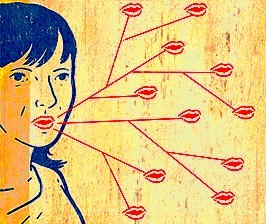
Cities have meaning.
The word "CITY" is closely related to the words civility, citizen,
civic, and civilization. Their Latin roots are civis, civicus, and civitatem.
This strongly implies that to live together en masse requires that we act in a civilized manner.
When POTUS speaks, people listen-- at least at first,
when the audience is huge and hopeful.
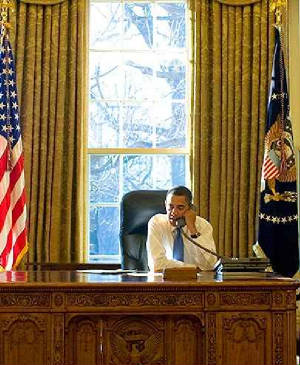
|
| President Barack Obama's first day at work in the Oval Office, January 21, 2009. |
"However long we are keepers of the public trust, we
should never forget that we are here as public servants."
- Barack Obama
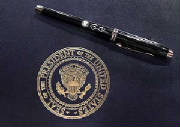
|
| "I'm a leftie; get used to it." |
go to slide show of 44 U.S. presidents
Presidential
rhetoric is the sound of leadership or pure blather. We crave the former.
Inaugural addresses can inspire or bore. The best have echoed through the years of our national struggle to reveal our triumphs
and crises, our soul and deeds, our anguish and dreams. Inaugural oratory focuses our attention on the big issues facing our
nation and charts a path to higher ground.
It helps if POTUS is wise, loves language, has persuasive oratory skills,
and uses memorable phraseology that remains in our minds and hearts. If that happens-- the first time out-- the speech will
long be studied to understand our times, and treasured throughout our history to remind us of 'the better angels of our nature.'
more on Washington's 1789 Inaugural Address
more on Obama's 2009 Inaugural Address
go to all inaugural speeches: 1789-2009
go to interactive inaugural videos 1933-2004
go to rediscover George Washington
Now, here's a stimulating speech! Look up! The Clouds
are Lifting! It's Chaplin's speech in the final scene of "The Great Dictator."
go to speech in "The Great Dictator"
Embracing words:
Most of us know when it's appropriate to speak
standard English and when it's natural to slip into non-standard and slang. In either case we must be deft, careful. Words
make or break careers, win or lose elections, keep or fail friends and family.
 |
 |
Is it OK with you?
OK was the first word spoken on the surface of the
moon (by Buzz Aldren) and most of us say it every day. It is part of most languages in the world. Yet for more than a century
the origin of the word was the Holy Grail of etymologists. Allen Walker Read, at Columbia Univ. finally figured it out in
1964. Here’s the story.
A fad of facetious abbreviations swept through Boston newspapers
in 1838. Journalists cooked up jocular misspellings and wordplay with ‘silent letters." They used OW for all right,
KG for no go, KKN for commit no nuisance, and KY for no use. OK first appeared as shorthand for "all correct"
(or oll correct) on March 23, 1839 in the Boston Morning Post. It appeared in the New York Evening Tattler on September
2. By October it was is print in New Orleans. It made its Philadelphia debut in November.
OK was popular, but might have died out if New York Democrats
had not formed the OK Club (to honor Martin Van Buren, whose nickname was Old Kinderhook), which
received much publicity in the 1840 election.
So there you have it. But it’s still interesting
to revisit some debunked theories such as: OKEY from the Choctaw - Olla
Kalla from the Greek - Och Aye from Scottish -Oikea from Finnish - Aux
Cayes from French, or Open Key, a telegraph term.
A strange but well-circulated theory is that OK stands
for Orrin Kendall crackers which were supplied to the Union Army during the Civil War. Well, that's just crackers!
All this makes e-mail lingo like WYSIWYG
and ROTFL blatantly transparent (i.e. what you see is what you get, and rolling on the floor
laughing). But that’s OK.
|
|
 |
 |
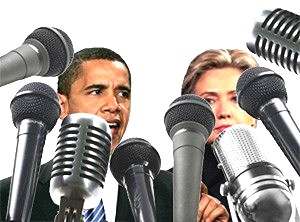
|
| YES, WORDS MATTER. |
"Writing... is the great invention of the world."
- Abraham Lincoln
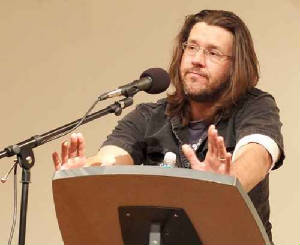
|
| Author David Foster Wallace |
David
Foster Wallace loved to write, tell stories, and experiment as
if he had a canvas on which he could do anything. The ironic wit and dark humor of his first novel, "The Broom of the
System," made him a star.
His imaginative and ambitious take on a future world in "Infinite
Jest," which had a non-linear plot and more than a thousand pages loaded with footmotes, made him a cult figure. Critics
marveled at his prodigious talent.
"There's so much about writing that's beyond the writer's
control."
- David Foster Wallace
more on a Wallace commencement address at Kenyon College
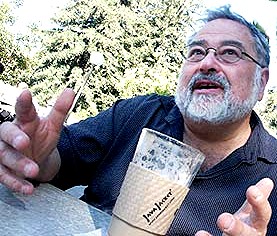
|
| Linguist George Lakoff at UC Berkely |
"Whenever the other side has you talking their language, they’ve
got you." - George Carlin
Doublespeak: We've been framed.
Politicians "frame" their issues in carefully chosen language to promote
their policies. Conservatives have mastered the skill and built an infrastructure that spins and twists words to invent the
terms we all use.
George Latoff, professor of linguistics and
cognitive science at UCB, illuminates these manipulations. He says the "Energy Crisis" in California should have been called
"The Grand Theft," such as it was.Consider lowering the "estate tax" or the "death tax." Which do you prefer? Connotations
of "estate" are mansions, elitism, and wealth. As for "death," that happens to all of us– so yes, get rid of that tax.
For 30 years, conservative think tanks have invested billions to
analyze and frame language. They are clearly ahead of the game. The "Great Society" is now the "Ownership Society," and no
one seems to mind. Latoff notes they constantly update their research to fine-tune to fire up their constituencies. They build
TV studios, budget to buy a lot of books to get them on the best seller lists. They hire image consultants to coach their
talking heads.
New phrases pour from political 'handlers.' How about "tax relief?" By
coupling these two words you get the image that taxation is an affliction. And anyone who doesn’t want to get rid of
the affliction is a nutcase. The Cato Institute came up with the magical "personal accounts" to replace "dismantle social
security."
And it has contributed new definitions for torture as well. Latoff sees
the verbal evasions and obscurantisms in "moral values." He sees the tangling and dissembling of language that resulted in
"War on Terror." The word terror is internal to a person, and activates fear. When you add the word war, which is a nation-state
problem– you get a powerful catch-phrase, albeit built upon subterfuge.
When speakers use terms that have been framed by the opposition they
only reinforce the notion behind the "frame."
Katrina vanden Heuvel, Editor of The
Nation, suggest a path out of the thicket of mangled language. Debates are won or lost on definitions of code words. So try
to debunk the opposition’s twisted language and double-speak.
To redefine reality, just reach for the dictionary. Your linguistic strategy
is to sound moderate while targeting your base audience. Framing trumps facts– so reframe the idea. Find something inventive
and break the code. Be inventive and break the code.
Editor's comment on 2012 primary election "speeches:"
Switching codes mid-sentence? Word mashing, mangling and mis-speaking
(the word is usually mis-used and confused with 'saying something one regrets' or having 'slips of the tongue'), self-contradicting,
crossed messages, and vagrant lying are the verbal and venal currency of political campaigns. This year the point is often
pointless self-contradicting babbling, grabbing at words that tilt the language to miss the frame no matter how stupid, self-aggrandizing
while trying to remember the place and time and buzz for whatever the group, squeezing out nonsense in inedible
and indicipherable chunks, no matter how convoluted or dumb. The voters deserve better.
If none of the above makes sense, then we've got to the heart of the problem.
go to George Lakoff
go to The Nation Books
 |
 |
Marshall McLuhan predicted that the ascendancy of the
'global village' would eclipse the few centuries of literacy.
"The
only hope of recovery is to place language foremost in education."
-
William Fowler
|
|
 |
 |
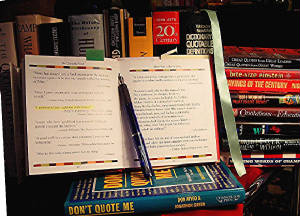
|
| Quote search. |
Quote Department...
"Elegance is refusal."
- Coco Chanel
Can it get more succinct? Acclaimed
couturiere Chanel revolutionized how we dress by simplyfying, paring down, and removing any fuss of Victorian residue. Elegance
was her by-word and she achieved it with knife-cut clean lines.
"Refusal" is the interesting part. An elegant dresser refuses excess
by removing something 'extra.' An elegant jazz musician removes notes and riffs. An elegant writer removes adjectives.
An elegant dancer says it all in one move.
A short quote shines with light-- and a bit of mystery. It leaves
room for us to ponder and interpret. This one is also a 'definition quote.'
Other quotes in this category are: "War is hell." (Gen. William T.
Sherman ), "Actors are cattle." (Alfred Hitchcock), "Publishers are demons." (William James), and "Civilization is paralysis."
(Paul Gauguin). All are compact and memorable.
Here's a good "double:"
"I've been on a calendar, but I've never been on time."
- Marilyn Monroe
Here's a good "triple:"
"Life is pleasant.
Death is peaceful.
It's the transition that's troublesome."
- Isaac Asimov
Most well-known quotes are two-liners, or couplets. Triples
are a rare find: Check these out:
"A guy hit my fender the other day. I said unto
him 'Be fruitful, and multiply.' But not in those words."
- Woody Allen
" You only live once. But if you work it right-- once
is enough."
- Joe E. Lewis
go to Brainy Quotes to find ideas wise and witty.
What quotes grab you? Whose words resonate and trigger
insights?
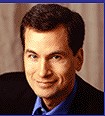
|
| Columnist David Pogue |
Info-tech, Biotech, Nanotech, Biztech. Huh?
David Pogue writes for The New York Times
"Circuits" in the 'tech' section-- and boy, is he cranky. He's a 'word guy' and can't bear the flood of
awkward and nebulous acronyms for new products from corporate America. WiFi? USB? He doesn't like 'em. Catch his columns
on New York Times online or visit his website for links to his columns.
go to David Pogue
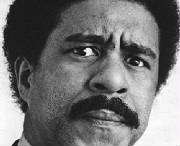
|
| Richard Pryor: dignified indignation. |
Name: Richard Pryor
Born: December 1, 1940, Peoria, Illinois
Nationality: American
Occupation: Comedian
Pryor owned comedy
in the 1970's-- with knife-sharp
insights into modern life. His work was passionate, political, personal, and painful. His brilliant routines used language
to fight injustice with laughter; his influence (other comedians revere him) set comedy on a new course. He burst into flames
in 1980, was diagnosed with multiple sclerosis in 1986, and was honored in 1998 at the Kennedy Center with the Mark Twain
Award for Humorists. After a lifelong struggle with heart problems he died of cardiac arrest on December 10, 2005. He will
be remembered with affection. Pryor lives!
"When you ain't got no money, you gotta get an attitude."
"I went to Zimbabwe...
I know how white people feel in America now: relaxed! Cause when I
heard the police car I knew they weren't coming after me!"
go to Pryor Knowledge on Salon
Using words to twist logic to makes sense
Paradoxical phrases and
comments intrigue. Their internal contradictions often find resolution in an elevated use of language. Consider these:
"Always
remember that you are absolutely unique. Just like everyone else." (Margaret Mead) "Free love is too expensive." (Bernadette
Devlin)
"It infuriates me to be
wrong when I know I’m right." (Moliére) "There are some ideas so wrong that only a very intelligent person could believe
them." (George Orwell) "A normal adolescent isn’t a normal adolescent if he acts normal." (Judith Viorst)
"I shut my eyes in
order to see." (Paul Gauguin) "Less is more." (Mies van der Rohe) "Seek simplicity and distrust it." (Alfred North Whitehead)
"There are a terrible
lot of lies going about the world, and the worst of it is that half of them are true." (Winston Churchill)
"Everybody hates me
because I'm so universally liked." (Peter de Vries)
"There's nothing wrong
with sobriety in moderation." (John Ciardi)
"Instant gratification
takes too long." (Carrie Fisher)
You get the idea. What may seem a bit off quickly
gains meaning. On reflection we see a truth.
This
"push me-pull you" kind of verbiage long fascinated Mardy Grothe. He is the author of "Oxymoronica:
Paradoxical Wit and Wisdom from History’s Greatest Wordsmiths."
more twisted logic that makes sense
"Precise, perceptive, graceful, incantatory English is disappearing from mass entertainment products.
Literacy is in a real danger of being obscured, if not eclipsed. The
prospects are real and frightening."
- Tom Shachtman
"Put a commonplace expression in its right place, clean it up, rub
it hard, bring it to light in such a position that it strikes with its youth, and with the same freshness, the same upspring
that it had at its birth-- and you will act as a poet."
- Jean Cocteau
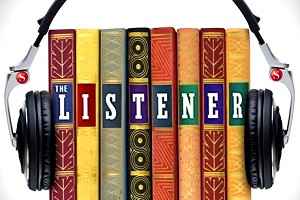
|
 |
|
|
|

